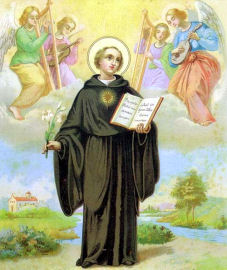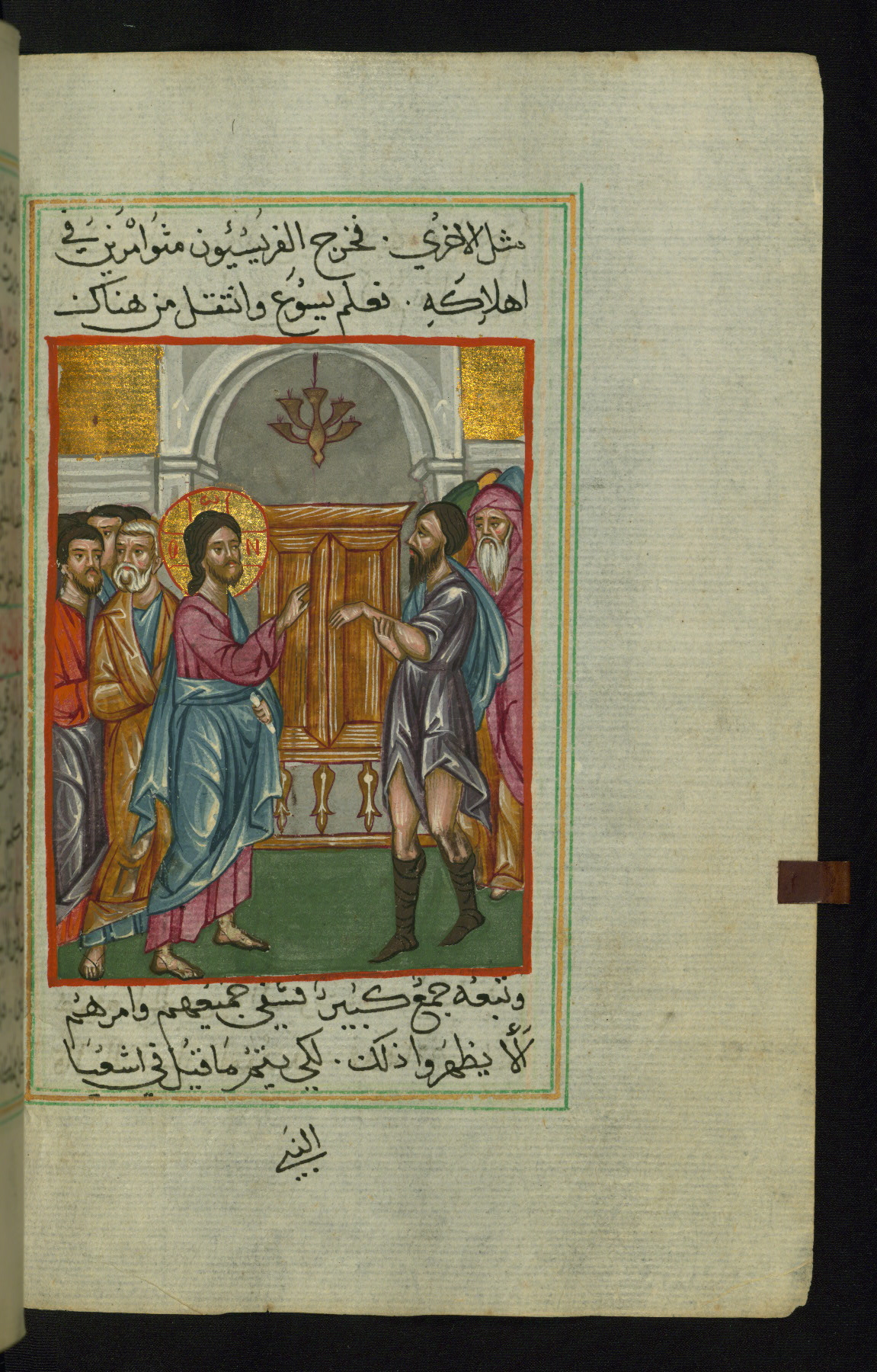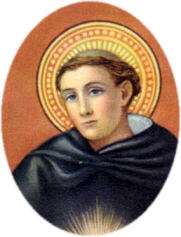Daily Readings for: September 10, 2012
(Readings on USCCB website)
Collect: O God, by whom we are redeemed and receive adoption, look graciously upon your beloved sons and daughters, that those who believe in Christ may receive true freedom and an everlasting inheritance. Through our Lord Jesus Christ, your Son, who lives and reigns with you in the unity of the Holy Spirit, one God, for ever and ever.
RECIPES
ACTIVITIES
PRAYERS
LIBRARY
Ordinary Time: September 10th
Monday of the Twenty-Third Week of Ordinary Time
Old Calendar: St. Nicholas of Tolentino, confessor
St. Nicholas of Tolentino, a native of Sant' Angelo, in the diocese of Fermo, was born about the year 1245. As a young man, but already endowed with a canon's stall, he was one day greatly affected by a sermon preached by a Hermit of St. Augustine and decided to enter this newly-founded Order. At first he lived at the hermitage of Pesaro and then at Tolentino where he died in 1305. His whole life was remarkable for its great austerity which was inspired by his great love of the cross. According to the 1962 Missal of Bl. John XXIII the Extraordinary Form of the Roman Rite, today is his feast.
St. Nicholas of Tolentino
 This Nicholas was born in answer to his mother's prayers. Childless and in middle age, she had made a pilgrimage with her husband to the shrine of St. Nicholas of Bari to ask for a son whom she promised to dedicate to God's service. When her wish was granted, she named the boy Nicholas and he soon gave unusual signs of saintliness. Already at seven he would hide away in a nearby cave and pray there like the hermits whom he had observed in the mountains.
This Nicholas was born in answer to his mother's prayers. Childless and in middle age, she had made a pilgrimage with her husband to the shrine of St. Nicholas of Bari to ask for a son whom she promised to dedicate to God's service. When her wish was granted, she named the boy Nicholas and he soon gave unusual signs of saintliness. Already at seven he would hide away in a nearby cave and pray there like the hermits whom he had observed in the mountains.
As soon as he was old enough he was received into the Order of Augustinian friars. On account of his kind and gentle manner his superiors entrusted him with the daily feeding of the poor at the monastery gates, but at times he was so free with the friary's provisions that the procurator begged the superior to check his generosity. He was ordained in 1271 and said his first Mass with exceptional fervor; thereafter, whenever he celebrated the holy Mystery he seemed aglow with the fire of his love. His preaching, instructions and work in the confessional brought about numerous conversions, and his many miracles were responsible for more, yet he was careful not to take any credit for these miracles. "Say nothing of this," he would insist, "give thanks to God, not to me. I am only a vessel of clay, a poor sinner."
He spent the last thirty years of his life in Tolentino, where the Guelfs and the Ghibellines were in constant strife. Nicholas saw only one remedy to the violence: street preaching, and the success of this apostolic work was astounding. "He spoke of the things of heaven," says his biographer St. Antonine. "Sweetly he preached the divine word, and the words that came from his lips fell like flames of fire. Among his hearers could be seen the tears and heard the sighs of people detesting their sins and repenting of their past lives."
During the last years of his life St. Nicholas was bedridden and suffered grievously. He died surrounded by his community. In 1345 a lay Brother cut off the arms of his body intending to take them to Germany as relics, and the friars then hid his body to prevent further attempts of this kind. It has not been found to this day, but the arms have been preserved. It is recorded that they have bled on several occasions, usually, it is said, before some calamity that befell the Church or the world.
Excerpted from A Saint A Day by Berchman's Bittle, O.F.M. Cap.
Patron: Lost souls; mariners; infants; animals; dying people; souls in purgatory.
Symbols: Crucifix and wreath of lilies; flaming star; doves and dish; partridge; fountain; basket with bread rolls; bread; lily; man in black Augustinian habit holding one of the symbols; star above Augustinian; Augustinian with star on breast.
Things to Do:
- A single phrase from a sermon effected St. Nicholas' conversion and made him a saint. An excellent example of the power of God's word! Christ once said, "Not by bread alone does man live, but by every word that proceeds from the mouth of God." In other terms: Bread nourishes one's physical life, the word of God nourishes one's supernatural life. Recall the parable of the sower about the seed that fell on good ground and produced abundant returns-a parable explained by Jesus Himself. The seed is the word of God. This point is particularly important. The word of God is seed containing limitless vitality. It does not yet live, but requires the good earth to burst into life, to become a living, growing plant. Spend some time today meditating on the words of the Gospel and praying that God will bring similar fruit from your life and make you a saint.
- Read other accounts of St. Nicholas' life here and here.
- St. Nicholas had a great love for the Holy Souls. He would offer Mass, pray and do penance for them so they could more quickly enter Heaven. Why not offer up a Mass or pray the Rosary today.
- The Convento di San Nicola located in the center of the beautiful town of Tolentino is a very popular place of pilgrimage. It has one of the most important fresco cycles of the 1300s, painted by the Master of Tolentino. There are also many excellent paintings in the elegant baroque basilica, a memorable cloister, the cell where St. Nicholas of Tolentino lived, and an interesting museum containing some fine ceramics. St. Nicholas is buried in the crypt. If you read Italian or if you just like to look at photographs you might find this site about the Basilica of St. Nicholas interesting.


 This Nicholas was born in answer to his mother's prayers. Childless and in middle age, she had made a pilgrimage with her husband to the shrine of St. Nicholas of Bari to ask for a son whom she promised to dedicate to God's service. When her wish was granted, she named the boy Nicholas and he soon gave unusual signs of saintliness. Already at seven he would hide away in a nearby cave and pray there like the hermits whom he had observed in the mountains.
This Nicholas was born in answer to his mother's prayers. Childless and in middle age, she had made a pilgrimage with her husband to the shrine of St. Nicholas of Bari to ask for a son whom she promised to dedicate to God's service. When her wish was granted, she named the boy Nicholas and he soon gave unusual signs of saintliness. Already at seven he would hide away in a nearby cave and pray there like the hermits whom he had observed in the mountains.